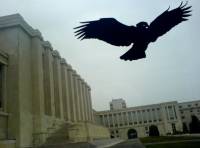
"We need a decision from the [UN] Economic and Social Council so that the commission can resume its work in a coherent manner," said Rodriguez Cuadros.
The 53-member commission, which will be scrapped when the council meets for the first time in June, has agreed to reconvene on March 27. The new human rights body is the result of a Swiss initiative.
The commission’s 62nd and final session was suspended for an initial week last Monday to await a decision on the council, which was adopted by the UN General Assembly on Wednesday.
According to Louise Arbour, the UN High Commissioner for Human Rights, the commission no longer has the legitimacy to intervene on issues that were once its domain.
Speaking on Friday, the Canadian said all of the commission’s pending decisions would be transferred to the new council.
"There will be no void, but inevitably a delay with some issues," she added.
Declaration of Human Rights
The body was often criticised for being open to sabotage by member states.
But as the only commission named in the UN charter adopted in 1945 in San Francisco, it has nonetheless succeeded in drawing up the fundamentals for the international system of protecting victims from state-sanctioned persecution.
A prime example is the Universal Declaration of Human rights, a treaty adopted in 1948 in Paris.
Afterwards, the commission pursued its role despite political upheaval, including the Cold War and decolonisation.
According to Adrien-Claude Zoller, president of the non-governmental organisation Geneva for Human Rights, the beginning of the end for the commission dates back to the 1993 UN human rights summit in Vienna.
"During that conference states that were hostile to these rights realised that they could form majorities," he said.
That was the reason why the Vienna summit almost ended with a backward slide on human rights.
This kind of threat of going in reverse was also in mind when the constitution of the new council was adopted last week.
Continual struggle
As Swiss Foreign Minister Micheline Calmy-Rey stressed recently, the defence of human rights is a continual struggle.
Switzerland made great efforts from the 1980s onwards. As a non-member of the UN at the time, Switzerland joined forces with Costa Rica to propose its first resolution within the commission framework, a text relating to the prevention of torture dating from 1979.
After the fall of the Berlin Wall in 1989, Switzerland’s involvement within the commission was reinforced, with the result that several Swiss were named special rapporteurs or independent investigators, said Jean-Daniel Vigny from Switzerland’s mission to the international organisations in Geneva.
Since its entry in the General Assembly in 2002 - accepted by 54.6 per cent of Swiss voters - Switzerland has managed to use this know-how to its advantage by helping to put the creation of the Human Rights Council on the UN’s agenda.
Related Sites
°UN Human Rights Commission 62nd session